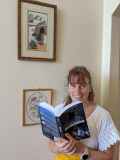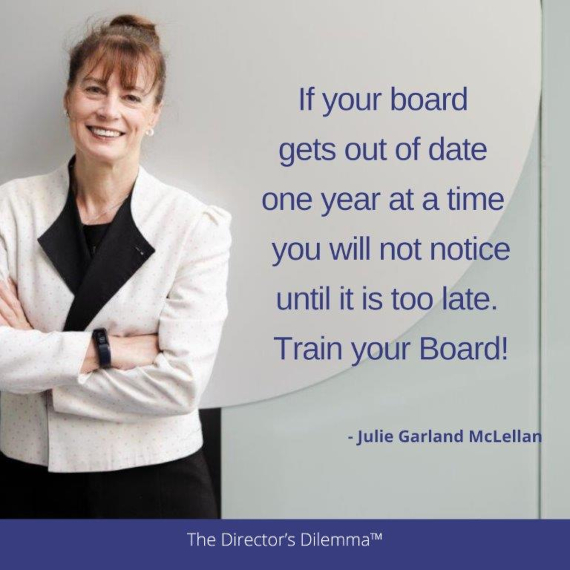|
|
|
|
|
|
|
|
|
Dear reader,
Welcome to the November 2021 edition of The Director's Dilemma. Each month this newsletter looks at a real-life scenario that happened to a board, perhaps to a board like yours, and considers a range of responses. The scenarios are de-identified to protect the individuals concerned. This month our board is a volunteer association that has gone from starved to replete and needs to handle the potential relationship fall out.
Of course, these scenarios are general, written to help you with practical information without the risks that attach to living these situations in real-life. I work with boards and directors as a confidential mentor to help them build great companies and maximise their impact. If you would like personalised service, please call me.
To read this email in a web browser, go to www.mclellan.com.au/newsletter.html and click on 'read the latest issue'. I hope you will enjoy the latest dilemma:
 Maria is the newly anointed chair of the people and culture committee of a large not for profit organisation whose board had been stagnant for many years. When she joined last year, she was the first new director since 2008. The directors were thrilled to have her and created the committee with a view to revitalising the board. Maria is the newly anointed chair of the people and culture committee of a large not for profit organisation whose board had been stagnant for many years. When she joined last year, she was the first new director since 2008. The directors were thrilled to have her and created the committee with a view to revitalising the board.
Maria's committee undertook a major piece of work to reach out to the members and seek nominations for the board. Several directors wished to retire, and it was a good time to bring in some fresh new directors without any worries about upsetting long-serving contributors.
There are four vacancies, and no incumbents are up for re-election. Six great members have put their names forward. Maria is now worried because she hears that all six are thinking they will be elected and they can't, it would exceed the maximum board size in the constitution.
What can Maria do to avoid alienating any enthusiastic volunteers and to get access to the inspiration and energy that all the candidates offer?
|
|
|
|
Jane's Answer
 Having a plethora of enthusiastic volunteers could be a great opportunity for Maria. The work her committee undertook would create a solid foundation for a successful board revitalisation and refreshment programme. Having a plethora of enthusiastic volunteers could be a great opportunity for Maria. The work her committee undertook would create a solid foundation for a successful board revitalisation and refreshment programme.
The maximum number of board members will be set out in the Constitution and must be complied with. The process for electing new board members from the membership will also be set out in the Constitution and the board may have limited influence in that process.
Assuming four of the six board candidates are successfully elected - what can Maria do to ensure the two candidates who miss out remain engaged? As Chair of the People & Culture Committee, there are a number of alternatives she could consider exploring:
-
the board sets up an aspiring or future director programme, offering the two unsuccessful candidates to be the first participants. This would enable them to learn about the workings of the board, gain improved understanding and ultimately be strong future board candidates.
-
each person is co-opted onto a board committee where their specific skill sets and expertise are a good match (provided the Committee Charter or Terms of Reference allows for this).
-
co-opting one or both individuals onto the board for a limited period of time, generally twelve months, within an AGM cycle (provided the Constitution allows for this).
-
if one of the individuals shows interest in the Board Secretary role and the incumbent is anticipating retiring, they could shadow the incumbent as part of an agreed succession plan.
Finally, regarding the four new board members - it's crucial they are given a well-considered and comprehensive induction. This will give them the best possible start in their new roles.
Jane Davel is Chairperson of St Andrew's Village Trust and a director of Rowing New Zealand, Cadastral Surveyors Licensing Board of New Zealand, and Electrical Workers Registration Board.
|
|
|
|
Julie's Answer

This is a great problem to have; and important to resolve with care and empathy.
Maria should reflect on all communications with the nominees; has anyone given any candidate reason to believe that their appointment is a given? If so, she needs to have an honest and private conversation with the candidate to reset their expectations and apologise for any misunderstanding.
Even if all applicants for a board position have been aware from the start that this election has an uncertain outcome, Maria still needs to communicate with them and with her board colleagues. She must ensure that everyone is aware of the election process.
Maria could then assist the candidates by providing an opportunity for each of them to give a short statement to the members outlining why they are standing for election to the board and how they would propose to serve the organisation if elected. After that it is up to the members - only members can elect directors.
Maria should investigate other opportunities for candidates to serve, and to be recognised for serving. Many boards have an independent member on board committees (someone who is not a director or an employee but who brings an informed perspective to enrich discussions). These committee members make great future directors. Are there opportunities to volunteer in operations or stakeholder relations? Can they be appointed to future casual vacancies if they arise?
At very least, Maria must ensure every candidate, and especially the unsuccessful candidates, comes away from the process feeling that they have been respected and valued and that they would stand again!
Julie Garland McLellan is an experienced non-executive director and board advisor based in Sydney, Australia.
|
|
|
|
Ricardo's Answer
 Maria's concern is not to upset valued members and at the same time, her focus is to add the best possible directors to the Board. She is actually in a good position because she has more interested, strong candidates than vacancies. Maria's concern is not to upset valued members and at the same time, her focus is to add the best possible directors to the Board. She is actually in a good position because she has more interested, strong candidates than vacancies.
It is probable that any evaluation done by her or other Board members will be biased by the knowledge they might have of the applicants or by the fear to upset them. The best solution is to hire an external professional firm that understands board evaluations, succession planning and leadership development. This firm will start by asking the right questions which will lead to understanding and defining the priorities of the Board in the present environment.
Putting these needs on paper, and adding a diversity policy, will help formulate a comprehensive board seat specification. Thereafter, the six applicants will be interviewed by the firm. They will explain the process and ask the right questions without giving the impression of an examination. This will ensure the selection process is without biases or preferences and is conducted in a professional way.
The firm will discuss the findings with Maria, and it will become clear which candidates to prioritize, and ultimately which ones to appoint. Maria will communicate with the selected ones and finalise their appointment. As a last step a clear communication of the results should be given personally by Maria to the members that were not selected.
The end result would probably be that no one will remain with hard feelings and that the composition of the Board will be the best possible.
Ricardo Backer is chairman of General Managers and HR VPs Group for Vistage Worldwide and Founder and Managing Partner of Backer Partners. He is a certified director for public companies from the Instituto de Gobernanza Empresarial y Publica and is based in Buenos Aires, Argentina.
|
|
|
|
Julie’s News
October was the month that Australia has been waiting for; after the excitement of hosting a session with governance greats Mervyn King, Bob Garratt, and Peter Dey (you can watch a recording at https://lnkd.in/gRvCYThJ) came the excitement of finally starting to remove Covid
restrictions and get back to normal life.
I did some more board training and presented for the PSA NSW Chapter (always nerve-wracking to present to professional speakers). Most of the month was spent on my own boards, gaining familiarity with my latest board appointment, and finishing off the reports for some board reviews.
Do you like video?
Readers who follow me on LinkedIn may have noticed that I have been posting short video insights. If you are frustrated about losing them and not being able to find them again or share them easily, you might like to visit and subscribe to my YouTube channel. I won't spam you, and as a subscriber, you will see a link to the channel whenever you visit YouTube. The videos are in two lists: 'Quick Insights' up to three minutes long and 'Presentations and Classes' up to an hour long.
Book Review - Corporate Governance 3.0 by Karl George, Simon Osborne, Alexander Van de Putte et al.
 I was thrilled to be invited to contribute a chapter for this great compendium. Of course, I was most excited in the final chapter about whether, and how, corporate governance 4.0 is emerging. I was thrilled to be invited to contribute a chapter for this great compendium. Of course, I was most excited in the final chapter about whether, and how, corporate governance 4.0 is emerging.
The book ranges across a wide spectrum of governance topics which include the role of the company secretary, the comparative trajectories of governance in various jurisdictions, and the need for an inclusive model of governance that takes account of a range of stakeholders allowing sustainable and resilient organisation development.
The writing is well supported by detailed references and this book will lead you on a journey that can go wherever you need or want it to.
Available at Amazon.
Inspirational quote for October

Not related to the dilemma this month - still a good quote to remember. I adapted it from one of Benito Mussolini's quotes about plucking a chicken one feather at a time. I don't often quote Mussolini; this is an exception!
There is still time to book some board training this year.
Do you know where to focus your director and board development?
Boards often struggle to get cut through and drive company performance. They work hard, then they work harder, then call in a consultant who recommends some changes, then they work harder still.
If that sounds like your board, don't worry. It is likely that you have simply been focusing on the wrong stuff. I have made a diagnostic tool that might help you to prioritise the actions that will free your board from the drudgery and allow you to maximise your impact. You can take the diagnostic here:
https://directorsdilemma.scoreapp.com
Call me afterwards for help with revitalising your board.
A note on names - A few readers have asked me where I find the names for the protagonists in each case study; I 'borrow' them from people I meet or things that I read. Maria is a historically feminine name of Latin origin. It can be translated to either mean "of the sea," "bitter," "beloved," or "rebellious." Maria is also a feminine variation for the Roman name Marius, which means 'Male'. Our protagonist must avoid being confused and ensure that her name becomes synonymous with 'trusted' and 'reliable' as she leads her board through a very good problem that many other boards would love to have.
This newsletter - If you have any ideas for improving the newsletter please let me know. If you are reading a forwarded copy, please visit my website and sign up for your own subscription.
Suggestions for dilemmas - Thank you to all the readers who have suggested dilemmas. They are greatly appreciated. I will answer them all eventually. I could not write this newsletter without your help and without the generous help of all the experts who respond each month to the case studies.
Be a contributor - if you would like to attempt a response to the dilemmas for publication you will be most welcome. Simply reply to this email and let me know. I am always on the look out for new talent from around the world so please reach out if that sounds like something you could do.
Let's connect - I use LinkedIn to share information about boards and directorship with my friends and acquaintances. If you use LinkedIn and we are not yet connected I will welcome a connection from you. You can find me at linkedin.com/in/juliegarlandmclellan.
Let me help you - I would be delighted to speak for or train your board, staff, audience and/or group. If I can help, please contact me at julie@mclellan.com.au.
Farewell until the next issue due 1 December 2021. I look forward to greeting you again then. In the interim I hope you will enjoy health, happiness and hard work.
Enjoy governing your companies!
Best regards,
Julie

Main Photo by fauxels from Pexels
Quote Illustration by Julie Garland McLellan
Disclaimer:
The opinions expressed above are general in nature and are designed to help you to develop your judgement as a director. They are not a definitive legal ruling and do not constitute legal advice. Names and some circumstances in the case study have been changed to ensure anonymity. Contributors to this newsletter comment in the context of their own jurisdiction; readers should check their local laws and regulations as they may be very different.
Privacy: I am privileged to have your contact details and keep them as safely as possible. I will alert you if they are ever accessed by any unauthorised person (the technical staff at ayuda help with publishing and issuing the Director's Dilemma and have access so they can send the newsletters to you). I do not sell your details to anyone; they are kept only for the intended purpose - sending you this newsletter and helping to build the judgement of company directors by providing a safe way to consider potential responses to real life events.
|
|
|
|
|
|
|
 Maria is the newly anointed chair of the people and culture committee of a large not for profit organisation whose board had been stagnant for many years. When she joined last year, she was the first new director since 2008. The directors were thrilled to have her and created the committee with a view to revitalising the board.
Maria is the newly anointed chair of the people and culture committee of a large not for profit organisation whose board had been stagnant for many years. When she joined last year, she was the first new director since 2008. The directors were thrilled to have her and created the committee with a view to revitalising the board.
 Having a plethora of enthusiastic volunteers could be a great opportunity for Maria. The work her committee undertook would create a solid foundation for a successful board revitalisation and refreshment programme.
Having a plethora of enthusiastic volunteers could be a great opportunity for Maria. The work her committee undertook would create a solid foundation for a successful board revitalisation and refreshment programme.
 Maria's concern is not to upset valued members and at the same time, her focus is to add the best possible directors to the Board. She is actually in a good position because she has more interested, strong candidates than vacancies.
Maria's concern is not to upset valued members and at the same time, her focus is to add the best possible directors to the Board. She is actually in a good position because she has more interested, strong candidates than vacancies.

